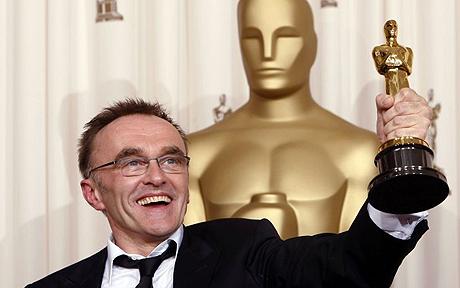 Brit director Danny Boyle chats about his Oscar-hauling triumph…
Brit director Danny Boyle chats about his Oscar-hauling triumph…
Slumdog Millionaire cleaned up at the Oscars. Are awards important to you?
Well… Anybody who tells you they don’t dream about that stuff is lying. Because everybody does. It’s great for all of us, ego-wise. But more importantly, it’s wonderful for the film.
Were you trying to show people a side of India they haven’t seen before?
A bit like the title really, India has got contradictory elements. It’s got the most incredibly povery, cruelty, violence. And also the most extraordinary transcendental generosity. It’s the city of dreams. But as a British filmmaker, I wanted to root it in reality.
What did people think about the film?
They were shocked. They were astonished that I would want to go to the slums to film. Because they don’t really go there! Because they can build a slum! There’s no shit in the ones they build. Where as in the real slums, there’s no toilets. So people shit on the ground. So they didn’t like that much…
Did it help that you had a European point of view?
I’d never been there before, so in one sense you feel very unqualified, but in another sense it’s quite good. Because sometime, cities, it’s good to have a stranger who’s not been there before, turn up. And you do go, ‘Oh my God!’ The people who live there tend to blinker themselves a bit. If you embrace the contradictions that happen there, you will learn about life, about yourself and about filmmaking.
Do you think people will be surprised by how brutal Slumdog is?
The brutality is all there. Although you don’t see anything, it’s all implied. Because it originally meant to be a PG-13 in America, And it got an R certificate because of its intensity. But you know, what can you do?
What shocked you while you were in India?
You do see stuff there that is very shocking. Stuff that makes you think, ‘Oh… my… God.’ For instance, there was a guy outside our hotel. Every day he was there. And this guy had had his hands cut off. Both his hands had been cut off. Deliberately. You could see. It’s not an industrial accident. He’s a beggar. He’s a lifetime beggar.
Did you give him money?
All you want to do when you see that is, you want to do what the American does in the film, is you want to give him $100 straight away. In fact, the $100 goes straight to the gangster who runs that street corner. And it’s confirmation to the gangster that this technique works. Chopping his hands off. So he’ll do it to someone else, because it works. You have to somehow accept it.
Did that inspire some of the scenes in the film?
Yes, you do have to put it in the film, because I wanted the film to be a full picture of the town. And then a Bollywood dance is at the end. Because that is very much part of the city’s life. This terrible side and this wonderful side are together.
How different is your film to Bollywood movies?
Bollywood doesn’t really bother about that. It’s more interested in the dreaming, the fantasy part of it. Anil Kapur, who plays the host of the show, is a big Bollywood star. And he said to me, he didn’t think it was quite extreme enough for India’s mainstream audience. For them, it’d be more extreme: they would be more coincidences, more melodrama , more hysterical.
How did you shoot on the streets?
We shot with small digital cameras, which gave us a kind of flexibility in busy areas and in the slum areas and places like that, because they’re very narrow and very congested so it gives you an advantage in those places.
Was it tough to track down the right actors?
We cast for about five months. The only one I couldn’t find was Dev, the lead actor. Because everyone I met there was like bodybuilders. To be a young actor in Bollywood, you’re buff. You’re built. It’s the bodies – they don’t look like human beings. They just look like male models. Their heads actually look quite small because they only kids really! And again, Bollywood’s not bothered about that: they want the shirt to come off in the Swiss Alps music sequence!
So how did you find Dev Patel?
I wanted a loser. What’s interesting about Jamal is his determination. His strength is hidden inside. My daughter said, ‘There’s this guy in Skins you should see.’ I met him and he was great. It was him. And in India, they go, ‘Well, that’s an example of destiny. You searched the whole world for your lead actor and he lives next door to you. That’s destiny.
What have you learned about making films in faraway countries?
Well, I’d made a big mistake on The Beach. I took hundreds of crew. I was like a James Bond movie going there. You’re just an invading army! You haven’t got machineguns or artillery. But you might as well have, because you just flatten everything in your path. So I would take nothing, that would be my lesson. Take very little.
Did you learn much of the language?
Oh, yes. You’ve got to learn a bit of the language. The most beautiful one in India is “Dil Se”, which means “From the heart”. It’s really very tender, a very beautiful phrase. Not very useful in bars! But people love that.










